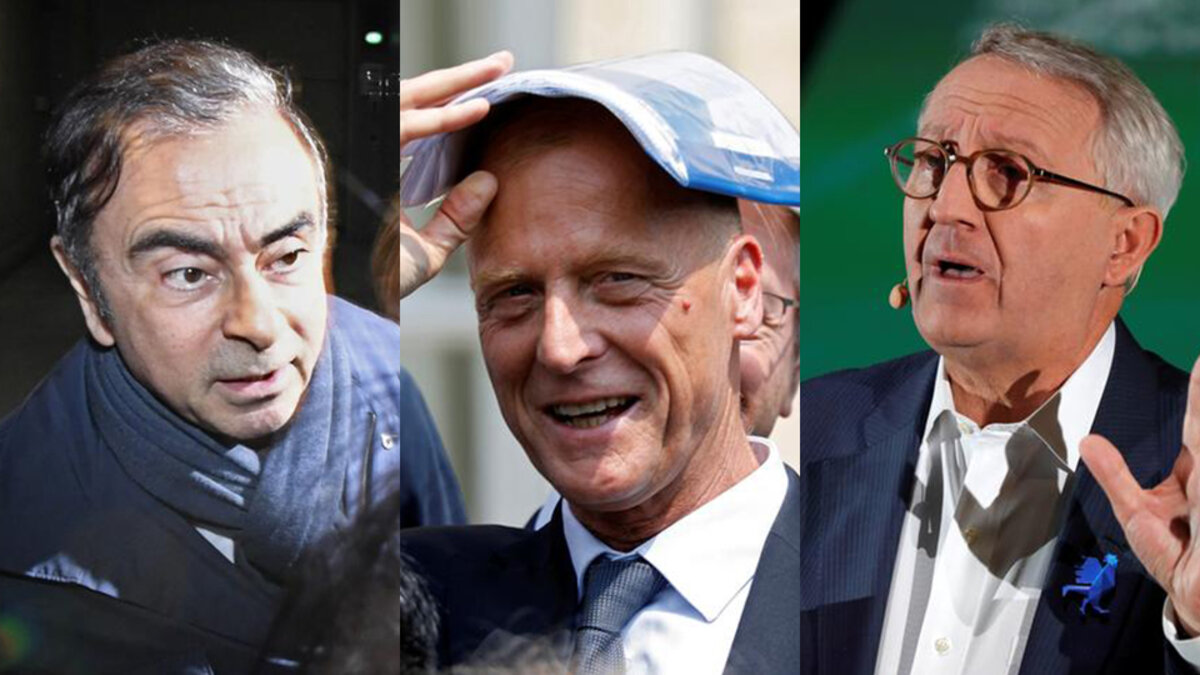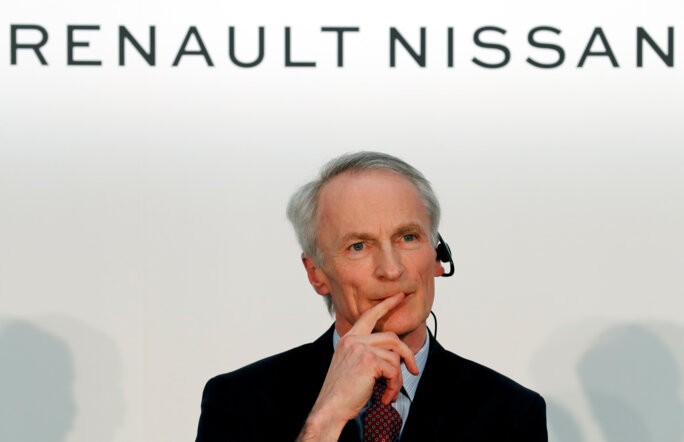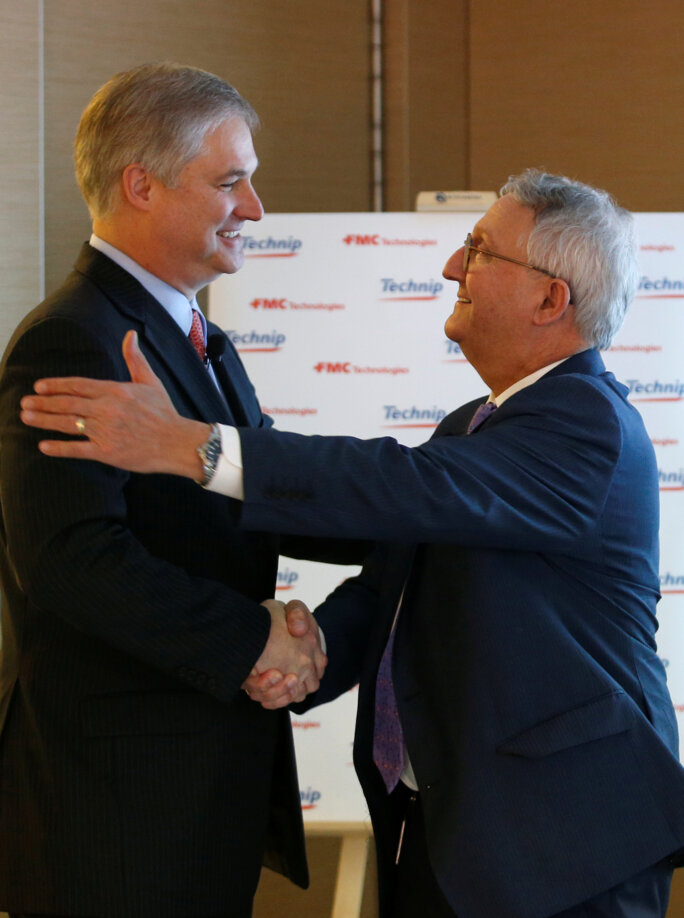There have been dozens of rows since the late 1990s about the size of the top-up pensions awarded to the bosses of some of France's biggest companies. For example, there was a scandal over Daniel Bernard who left supermarket chain Carrefour in 2005 with 26 million euros set aside for his pension; another involving Antoine Zacharias, who left construction giants Vinci in 2006 with a 128 million euro pension pot and who also hoped to get 250 million stock options on top of that. This was followed by the row over Pierre Richard who was guaranteed an annual income of 300,000 euros for the rest of his life even though when he left the public finance institution Dexia in 2008 it was in a desperate situation in the middle of the financial crisis and needed a six-billion-euro state bailout.
Then there was anger over the 325,000 euros-a-year pension for Didier Lombard who left as chairman of France Telecom in 2010 following a wave of suicides among employees (in relation to which a trial is due to start in the coming weeks); this in turn was followed by widespread astonishment at news that Daniel Bouton was due to get 735,000 euros a year after his departure from the bank Société Générale.
In 2013 Philippe Varin had to give up his claim to a 21 million euro pension pot to silence the row over his departure from car makers PSA Peugeot Citroën. Similarly, the board of directors at energy giant GDF-Suez (now ENGIE) felt obliged cut back on the 21 million euros that had been set aside for Gérard Mestrallet on his departure in 2014. Then in 2018, under pressure from the government and President Emmanuel Macron, Georges Plassat also had to relinquish his four million euro pension pot when he left Carrefour.
These are just a few examples. Yet it is only in recent days that France's finance minister, Bruno Le Maire, seems to have discovered there is a problem with the endless greed of some business bosses.
The more recent revelations of the lifetime pension of 765,000 euros a year promised to Carlos Ghosn as former CEO of Renault-Nissan, the 36.8 million euros guaranteed to Tom Enders as he steps down this month as CEO of Airbus and the 14 million euros earmarked for Thierry Pilenko for his departure from energy industry engineering firm TechnipFMC seem to have opened the minister's eyes to the issue. Such payments, Bruno Le Maire, announced on April 4th, were the hallmark of “capitalism from another era”, as if he had just become aware of the hidden side of neo-liberalism.

Enlargement : Illustration 1

In a bid to silence the criticism, the minister of finance promised new rules governing the future remuneration packages of bosses. He announced that the level of top-up pensions - which are not subject to social charges – should be fixed in advance by contract. Moreover, he said, annual pensions should not exceed 30% of a boss's annual salary, while company chiefs should also not be able to benefit both from a top-up pension pot and a bonus for agreeing not to work for a rival on their departure.
“This measure will become a legislative measure, and will be enshrined in law, as it is clear these people don't want to understand,” said Bruno Le Maire. The new rules are expected to take the form of an ordinance as part of new legislation currently being debated, the loi Pacte, which covers privatisations, tax thresholds for companies, and pensions.
However, critics fear that the minister of finance's stated determination to fight against the “intolerable excesses” of some business leaders risks quickly fading away. It is, after all, not the first time that a French government has threatened to legislate on bosses' pay. In 1999, after the scandal of the 100 million francs (just over 15 million euros) of stock options awarded to Philippe Jaffré when he left the oil giant Elf (now named Total), the socialist government under prime minister Lionel Jospin promised to provide better controls over such payment packages. It quickly shelved these plans once the row died down, preferring instead to rely on the “good practices of corporate governance”.
In 2007 Nicolas Sarkozy swore during the presidential campaign that he would attack the so-called golden parachutes, top-up pensions and other “over-the-top remuneration” enjoyed by some bosses. But in the autumn of 2008 his government under prime minister François Fillon buried this promise, taking the view that the AFEP-MEDEF code of conduct on corporate governance from those two industry representative bodies was enough.
Then in 2012 François Hollande committed during his presidential campaign to attacking the exorbitant remuneration of bosses. But a new taxation rate of 75% on the highest salaries – above one million euros – was in the end paid by the companies rather than individuals after the initial plan was struck down by the country's top administrative body the Constitutional Council, on the grounds that it was “confiscatory”. This new tax rate only lasted two years.
There are reasons to believe that the current promise of a government ordinance on top-up pensions - if it ever sees the light of day - will come to a similar fate. Already the government has confirmed a first backwards step; it recognises the principle of top-up pensions, even if it wants to control the amount. Yet this perk given just to bosses, and which is totally free from social charges and the CSG tax aimed up topping the social security budget, is not an idea that should just be taken for granted and accepted.
The chairmen and managing directors of top companies already benefit from exceptional levels of remuneration: they combine a high fixed salary, variable pay calculated in such a way that they are almost guaranteed to reaching the threshold each year, director's fees and many other benefits.
In recent years stock options – judged not to be reliable enough as a payment vehicle because their value can fall to zero according to how the shares perform – have been replaced by what are called 'performance shares' which are given if certain performance criteria are met. The advantage of these is that they are free to the recipient. So the top executives are guaranteed to receive some capital whatever the ups and downs of the share price.
At the same time, to counter the criticism of golden parachutes, boards of directors agreed to change the terms of contracts awarded to top executives and include a non-competition clause – preventing them from going to work for a rival within a set period – which allow them to get guaranteed compensation under their contract when they leave, paid in complete discretion.
Thanks to the cumulative effect of these different measures, the heads of major French groups have been among the best-paid in continental Europe. In such circumstances why should companies ensure their bosses get a supplementary pension too, when they have the means to fund one themselves? In other eras such practices could have been described as a misuse of company assets.
To justify these practices bosses point to the personal risks taken by the heads of companies, and the fact that they can be dismissed on the spot - though it is worth noting this hardly ever happens in practice. Companies and top executives say these uncertainties justify the granting of certain financial guarantees. Again, it is worth noting that these same bosses who ask for greater protection for themselves are also at the same time calling for a reduction in rights and social protection for employees.
The government appears to fully share this vision. On the one hand they have watered down employment regulations and social guarantees and safeguards, allowed immediate redundancies to take place, imposed limits on redundancy pay-offs, and plan to reduce pensions and get rid of special pension systems. But on the other hand they seem to judge it legitimate for a 'happy few' bosses to benefit from more and more exorbitant guaranteed payments.
As far as the government is concerned there is no question of demanding that bosses give up their top-up pensions, which come on top of normal pension arrangements. Instead they simply want greater supervision of what amounts to an income for life. And it is not certain that even this project will be followed through to the end.
The deafening silence of state-appointed directors
For this government obviously does not have any desire to impose a stricter framework on bosses remuneration. And despite the media hype about Bruno Le Maire's announcement, one should not forget that the last three pension awards which caused a row were at Renault, Airbus and TechnipFMC. These are groups where the French state is a shareholder - either directly or through another body - and where directors who are appointed by and supposed to represent the state sit on the boards of directors.
Yet up to the time when these issues became public, these state-nominated directors never seem to have raised or uttered the slightest objection over top-up pensions, golden parachutes, departure bonuses and other competition clauses earmarked for company bosses.

Enlargement : Illustration 2

In its recent response, made on April 3rd 2019, the Renault board did indeed decide to cancel Carlos Ghosn's top-up pension after coming to the view that the required conditions to pay it to the group's former CEO had not been met; because he no longer worked for the company at the time he asked for it, as is stipulated in his contract.
But this belated opposition to the top-up pension seems more linked to the zeal of the new boss at Renault to clean things up than any government objections. New chairman Jean-Dominique Senard has decided to take advantage of the criminal investigations into Carlos Ghosn in Japan to bring back some order to a group which critics say has lost sight of all ethical and governance rules for some years.
And if the government had wanted it could at least have raised at board level, via its state representatives at Airbus and TechnipFMC, the question of whether the conditions had been met to go ahead and pay such compensation to their departing bosses.
Tom Enders is leaving the Airbus group having carried out major reorganisation work. But can it be said that he leaves it in a good state? All or nearly all of those in charge of different construction programmes at the group have left or are about to leave without their succession having really being planned, leaving the aircraft manufacturer in a state of great uncertainty. The A 380 project is poised to be stopped and 3,000 jobs involved in making this wide-body aircraft are under threat.
In particular, the way that Tom Enders and his director of legal affairs John Harrison have handled the group's corruption cases has left Airbus in a very fragile situation, at the mercy of the American justice system. Does that justify the 36-million-euro compensation package he is due to get on his departure?
The same question can be asked even more acutely in relation to Thierry Pilenko, the managing director of TechnipFMC. Two years after merging French company Technip with the American FMC – a move supported by Emmanuel Macron when he was economy minister – the fusion has, as feared, turned into a fiasco. The group lost two million euros in 2018. Some 90% of its turnover comes from Technip's activities, with FMC's activities struggling.
Despite this, 700 jobs are planned to be shed in France while all the group's strategic operations are in the process of being moved to Huston in the United States. Meanwhile, the group has announced that it has undergone a corruption investigation by the American justice system and risks some very heavy fines. By coincidence, before joining Airbus John Harrison had been director of legal affairs at Technip, where his job was to put the group's affairs in order.
The government today defends itself by saying that it had no means of countering the decisions taken by the TechnipFMC board. Bruno Le Maire has said that as the group's headquarters is officially in London the AFEP-MEDEF code in France cannot apply to it.
Aside from the fact that France's Ministry of Finance had all the means at its disposal to stop this disastrous merger in the first place, and then to reject the move to London, the French state's two representatives – the public investment bank the Banque Publique d'Investissement (Bpifrance) owns 5.6% of the shares – or more generally the directors representing Technip at least had the means to raise questions or oppose some decisions.
Yet at no time do they seem to have been troubled by the situation. They approved the payment of ten million euros to its new CEO, Douglas Pferdehirt, making him the best-paid boss on the France's CAC 40 stock market index despite its poor results.
The directors' fees at the company were meanwhile increased considerably, going from 30,000 dollars to 300,000 dollars per person. The directors did not protest, either, when they discovered the 14 million euros compensation package paid to the outgoing Thierry Pilenko. Is that the right sum for having placed a world leader in engineering, technology and services for the energy industry under American control?

Enlargement : Illustration 3

So ministerial sleights of hand will not change the fundamental situation: the government is deliberately arranging its own impotence on the issue of bosses' pay. For despite the debacle over corporate governance at Renault, the government regard company managements as being under the absolute control of bosses, and not as a shareholder-led democracy.
The enrichment of a handful of people and deepening inequalities contribute to the government's vision of the world, of how the economy should be. And the announcement of a new bill will not change this approach. The proposed new rules are just there to pull the wool over people's eyes, to amuse the gallery, until the rows fade away.
---------------------------------------------------------------------------
- The French version of this article can be found here.
English version by Michael Streeter


